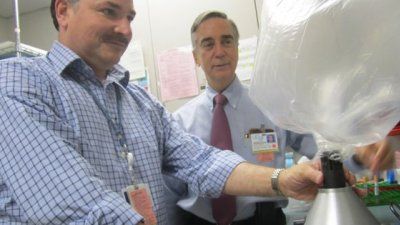University of California San Francisco
Give to UCSF-
-
Research Offers New Hope for HIV/AIDS Patients with Cancer
<p>A proposed new treatment to help HIV/AIDS patients suffering from Kaposi’s sarcoma, the most common form of cancer in people with HIV, is now one step closer to becoming a reality thanks to a program that supports promising early-stage research.</p>

-
Secrets of Lung Cancer Drug Resistance Revealed at UCSF
People with lung cancer who are treated with the drug Tarceva face a daunting uncertainty: although their tumors may initially shrink, it's not a question of whether their cancer will return—it's a question of when. And for far too many, it happens far too soon.

-
Low-Dose Vitamin D May Not Prevent Fractures in Women - What about High Doses?
<p>Vitamin D and calcium to prevent bone fractures in healthy, postmenopausal women does not work, at least at low supplemental doses, according to the United States Preventive Services Task Force.</p>

-
Cancer's Next Magic Bullet May Be Magic Shotgun
A new approach to drug design, pioneered by a group of researchers at UCSF and Mt. Sinai, New York, promises to help identify future drugs to fight cancer and other diseases that will be more effective and have fewer side effects.

-
Media Advisory: UCSF Hosts Bone Marrow Transplant Reunion
To celebrate nearly a quarter-century of advances in hematology and transplantation, UCSF is holding a reunion of patients from the UCSF Medical Center who have undergone bone marrow transplants.

-
New Lung Cancer Test Predicts Survival
In the two largest clinical studies ever conducted on the molecular genetics of lung cancer, an international team led by scientists at the University of California, San Francisco (UCSF) has demonstrated that an available molecular test can predict the likelihood of death from early-stage lung cancer more accurately than conventional methods.

-
Some Breast Cancer Spread May Be Triggered By Targetable Protein, Study Shows
Scientists from the University of Helsinki, Finland, and UCSF have identified a cleaver-wielding protein that frees some tumor cells, allowing them to further misbehave. The discovery points to a new target for therapy.

-
UCSF Study Finds Medical Marijuana Could Help Patients Reduce Pain with Opiates
A UCSF study suggests patients with chronic pain may experience greater relief if their doctors add cannabinoids – the main ingredient in cannabis or medical marijuana – to an opiates-only treatment.

-
Deadly Skin Cancer Genes Identified
-
Clinical Trial Shows First Evidence That Anal Cancer is Preventable
A large, international clinical trial led by doctors at UCSF indicates that a vaccine to prevent anal cancer is safe and effective, according to a study reported in the October 27, 2011 issue of New England Journal of Medicine.

-
UCSF Joins Caltech in Creative Problem Solving to Advance Health Care
<p>Experts at UCSF and Caltech are pushing the boundaries of creative problem solving to address important clinical problems with the hope that the talent pool at both institutions, combined with an entrepreneurial spirit, will advance health care innovation.</p>

-
UCSF Team Discovers Key to Fighting Drug-Resistant Leukemia
Targeting a protein that leukemia cells use to stay alive may be the key to fighting drug-resistant leukemia, a discovery that may make cancer drugs more powerful and help doctors formulate drug cocktails to cure more children of leukemia, a team led by UCSF researchers reports.

-
UCSF Scientists Play Key Role in Success of Yervoy, a New Cancer Drug
<p>Yervoy, a new cancer drug that has been approved for the treatment of late-stage melanoma – and that is being used to treat other cancers in ongoing clinical trials – is based on a strategy for boosting the immune response developed and tested by scientists from UCSF and UC Berkeley.</p>

-
Can Painkillers Prevent Melanoma?
-
The Mere Existence of Whales
-
Saving Lives From Anal Cancer
-
In Brain Cancer, Unique Genetic and "Epigenetic" Profile Means Better Odds
Brain cancers are deadly more often than not, but UCSF researchers have determined that a particular genetic signature in is associated with longer survival, a discovery that may lead to better therapies for some of the deadliest brain cancers.

-
Cell of origin for brain tumors may predict response to therapy
For patients with glioma, the most common primary brain tumor, new findings may explain why current therapies fail to eradicate the cancer. A UCSF-led team of scientists has identified for the first time that progenitor rather than neural stem cells underly a type of glioma called oligodendroglioma.

-
UCSF thoracic surgeon explains lung cancer breakthrough
-
Genetics Research Accelerates Pace of Knowledge Gains
New technologies and techniques continue to accelerate the pace of discovery in human genetics research, a fact made clear by scientists who spoke about their searches for important mutations, gene variants and answers to basic biological questions at the UCSF Institute for Human Genetics’ fifth-anniversary symposium on Oct. 28.

-
UCSF Tops California Universities with Four NIH Director's New Innovator Awards
The National Institutes of Health (NIH) on September 30 announced 52 highly competitive awards for high-risk, high-payoff research for young biomedical scientists, and UCSF tops California institutions with four recipients.

-
Ferrera's Lasker Award-Winning Research Began at UCSF
Genentech scientist Napoleone Ferrara, who has just been named the winner of a Lasker Award, is being recognized for his noteworthy achievements made when he was a postdoc at UCSF.

-
Blood Stem Cell, Leukemia Link Illuminated in UCSF-Led Study
A UCSF-led team has discovered at least one key reason why blood stem cells are susceptible to developing the genetic mutations that can lead to adult leukemia.

-
UCSF-led team discovers familial link in rare childhood leukemia
A UCSF-led team has discovered a direct link between an inherited genetic mutation, a set of developmental abnormalities and a rare form of childhood leukemia called juvenile myelomonocytic leukemia, or JMML.

-
Vitamin D: Not just for bones, says San Francisco VA physician
It is well-known that vitamin D is essential for strong and healthy bones. However, in an article in the online “In Press” section of “Trends in Endocrinology and Metabolism,” a San Francisco VA Medical Center physician reviews recent scientific literature suggesting that the vitamin may also play a role in preventing cancer, fighting infection, and controlling or preventing auto-immune disease.

-
US Launches Novel Clinical Trial to Rapidly Screen Promising Drugs for Breast Cancer Patients
Taking an innovative path toward personalized medicine, scientists for the first time will be able to eliminate – at an early point in a clinical trial — experimental drugs that show poor efficacy, dramatically shortening the time it takes to get the right medication to the right patient with breast cancer.

-
Pancreatic cancer study reveals mechanism initiating disease, in mice
UCSF scientists have discovered how a mutated gene known as Kras is able to hijack mouse cells damaged by acute pancreatitis, putting them on the path to becoming pancreatic cancer cells.

-
UCSF Experts Help Shape 10-Year Plan to Prepare for Demand in Dementia Care
A panel of experts appointed by Mayor Gavin Newsom recently presented an action plan as the approaching “age wave may bring a potential crisis in Alzheimer’s and dementia care” to San Francisco.

-
Study Shows Cigarette Smoking a Risk for Alzheimer's Disease
A UCSF analysis of published studies on the relationship between Alzheimer’s disease and smoking indicates that smoking cigarettes is a significant risk factor for the disease.
